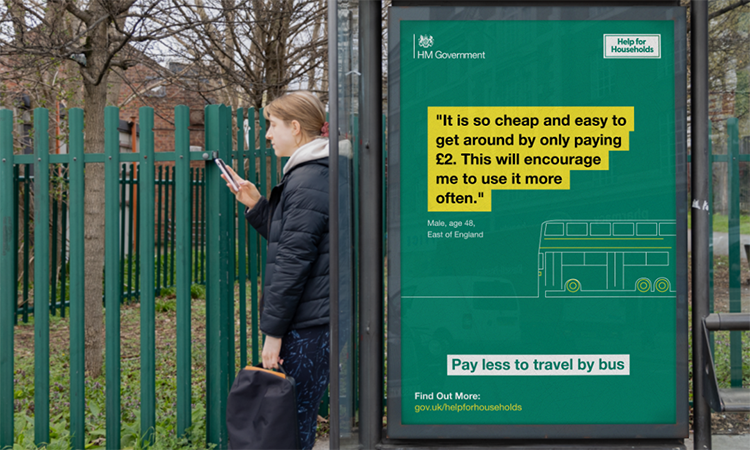UK government’s £2 bus fare cap scheme extended to June 2023
- Like
- Digg
- Del
- Tumblr
- VKontakte
- Buffer
- Love This
- Odnoklassniki
- Meneame
- Blogger
- Amazon
- Yahoo Mail
- Gmail
- AOL
- Newsvine
- HackerNews
- Evernote
- MySpace
- Mail.ru
- Viadeo
- Line
- Comments
- Yummly
- SMS
- Viber
- Telegram
- Subscribe
- Skype
- Facebook Messenger
- Kakao
- LiveJournal
- Yammer
- Edgar
- Fintel
- Mix
- Instapaper
- Copy Link
Posted: 1 April 2023 | Intelligent Transport | No comments yet
As a result of the success of the scheme, the £2 bus fare cap across England has been extended by an additional two months, enabling passengers to travel more affordably and sustainably.


Credit: Department for Transport
Thanks to £75 million of extra UK government investment, the country-wide £2 bus fare cap scheme – first launched across England in January 2023 – has been extended to 30 June 2023. The fare cap means that passengers can save on single bus tickets, helping them to travel more affordably to education, work and medical appointments.
Extended from 1 April 2023, the offer will apply to more than 5,000 routes across England from over 140 operators, as the government continues to help households through the difficult economic period, while levelling up transport and growing the economy.
With the average single local bus ticket costing £2.80, passengers can save almost a third of the ticket price and over 75% on some of the longest trips.
The scheme has already seen an uptick in passenger numbers. This extension will continue to encourage greater bus use and is expected to take up to four million cars off the road, supporting ambitions for greener journeys by minimising pollution and tackling congestion across the country.
A key part of the government’s Help for Households campaign, the fare cap is helping to deliver real savings for people most affected by the rising cost of living.
Transport Focus survey reveals impact of £2 bus fare cap on cost-of-living
Some of the biggest savings on the longest routes up and down the country thanks to the fare cap include:
- £12.50 from Lancaster to Kendall, a saving of 86% from £14.50
- £9.20 from Plymouth to Exeter, a saving of 82% from £11.20
- £6 from Newcastle and Middlesbrough, a saving of 75% from £8
- £6.50 from Hull to York, a saving of 76% from £8.50
- £13 from Leeds to Scarborough, a saving of 87% from £15.
The UK Roads Minister, Richard Holden, said: “Bus travel should be accessible and affordable for everyone. We know that people are struggling with rising costs, which is why we’re extending the £2 bus fare cap and continuing to put money back into passengers’ pockets. This will help to ensure that people can get around easily, no matter where they live – connecting them with work, education, doctors’ appointments, as well as friends and families – in turn strengthening communities and growing local economies.”
This measure builds on more than £2 billion already invested to protect buses in England since the pandemic and a further £1 billion for Bus Service Improvement Plans (BSIP) to improve services and keep fares down as part of the National Bus Strategy, published in 2021.
Bus fare caps are also available across major cities and local authorities, such as Greater Manchester and the West Yorkshire Combined Authority (WYCA), thanks to the £1 billion in BSIP funding.
Graham Vidler, Chief Executive of the Confederation of Passenger Transport, said: “The continuation of the £2 fare cap is a welcome boost for passengers during a cost-of-living crisis, reminding people that buses are a stress-free, affordable and environmental option for work, education, appointments, leisure or to see loved ones. Alongside low fares, passengers need the government to continue to invest in bus services to help to maintain connectivity across England, no matter where you live.”
The extension announcement will help to deliver on the government’s vision of a net zero transport network, with the cap estimated to take four million car journeys off of the road and building on the nearly £300 million already invested by the government for up to 1,400 zero-emission buses in England from the Zero Emission Buses Regional Areas (ZEBRA) scheme.
The UK government will continue to work closely with bus operators and local authorities to help passengers to continue to access reliable and affordable bus services after June 2023.
Related topics
Accessibility, Passenger Experience, Public Transport, Ticketing & Payments, Transport Governance & Policy
Related modes
Bus & Coach
Related countries
United Kingdom
Related organisations
Confederation of Passenger Transport, UK Government, West Yorkshire Combined Authority (WYCA)
Related people
Graham Vidler, Richard Holden








